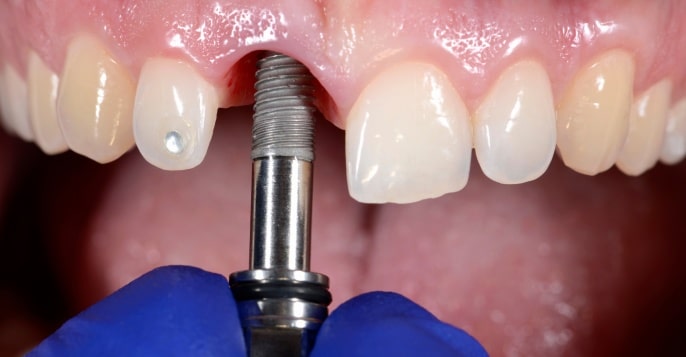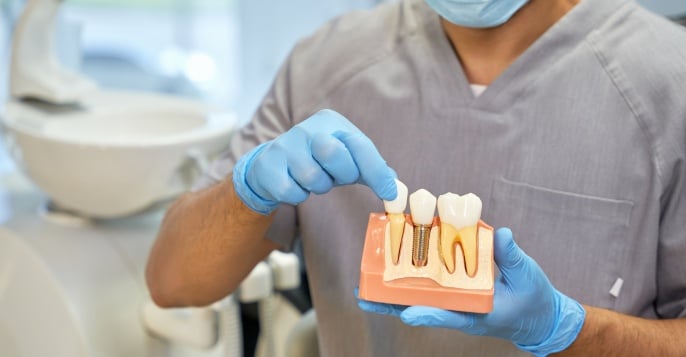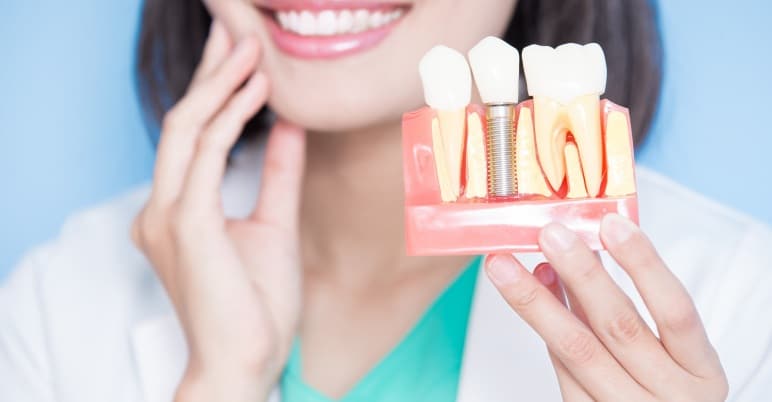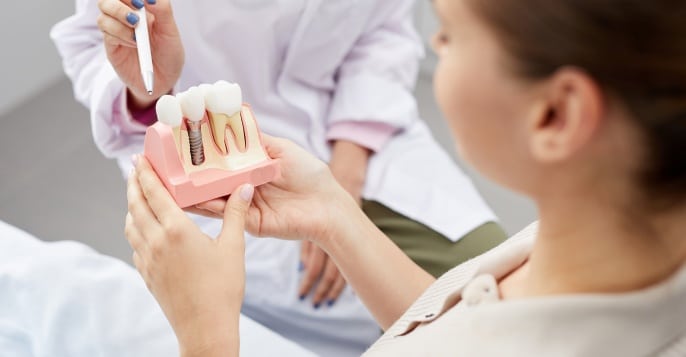Introduction
Dental implants stand out as the most efficient way available to get rid of the unwanted voids left by the missing teeth. Nevertheless, issues may arise as typically happens with any surgical intervention. It may come as a support during your recovery to know what risks are there and how to cope with them.
This article will discuss the immediate and long-term tooth implant side effects, their mitigation, and the maintenance of successful dental implantation for years.
All you need to know about dental implants in a nutshell
Dental implants or tooth inserts are bio-compatible root forms that are surgically embedded into the jaw bone for the purpose of supporting crowns or bridges. They act as a support for an individual or multiple prosthetic teeth.
Once they undergo a process called osseointegration which is bonding with the bone, they behave exactly like natural tooth roots in that they help to stabilize the crowns, bridges, and dentures that sit on them.
Despite the fact that implants can boast very high success rates between 95-98%, the knowledge of the negative side effects of dental implants, provides a chance for the patients to control their expectations more positively.
Common or Immediate what are side effects of dental implants

1. Pain and uneasiness
Most of the individuals undergoing a dental implant procedure complain of pain but more so in the area where the implant has been placed experience varying levels of discomfort. Such discomfort, however, is quite transient and can be easily managed with certain medications which would of course be prescribed by the dentist. If the pain lingers even after taking the prescribed medicines, call your dentist to discuss the same.
2. Swelling and bruising
After implant surgery, swelling of the gums and face is also normal. In some instances, bruising may also take place around the area. These symptoms mostly resolve within 48-72 hours and can be alleviated using ice packs on the targeted area intermittently.
3. Bleeding
Minimal bleeding at the site of the implant is expected within the first one to two days and is considered the most common side effect of dental implant. However, bleeding that is excessive or extended may be suggestive of problems and should be brought to the attention of one’s operating dentist.
4. Infection
There is a risk of infection when bacteria are able to access the implant or site. When infection presents as a tooth implant side effects, the symptoms would include excessive pain, swelling, or fever. Although this is a rare side effect of dental implant, to avoid infections good oral care practices such as adequate brushing, flossing, and going for dental check-ups should be adopted.
5. Loosening or failure of the dental implants
There are instances when the dental implant will not bond effectively with the surrounding bone. Such conditions may be due to the presence of restorable bone quality or infection, and in some cases, it may involve complete rejection of an implant. To avoid this it is very vital to adhere to the dos and don’ts of pre and post-surgery care and refrain from vices such as smoking where healing is required.
As much as dental implants are built to withstand the test of time, over a prolonged period there might, under some situations, the tooth implant side effects that may be common, especially in cases where regular checkups and monitoring are not adhered to.
Some of the most appreciable risks that may be encountered in the long term include the following:
1. Nerve damage
One of the rarest tooth implant side effects is nerve damage. In certain instances, when an implant is positioned excessively near a nerve, there may be instances of nerve injury leading to constant discomfort, numbness, or tingling in the region around the chin, the gums, and lips. Such cases are extremely rare and such occurrences can at best be prevented by carrying out powerful radiological scans for example a 3D CT scan before carrying out any surgery.
2. Sinus issues
In cases where maxillary implants are too close to the sinus or have a sinus perforation during placement, there is a slight possibility that the implant will extend into the nasal cavity leading also to infection of the sinus in a few patients. This can be solved through a careful assessment and performance of a sinus lift whenever it is indicated.
3. Allergies
Modern dental implants are mostly made of biocompatible materials, such as titanium or zirconia; however, a patient may be intolerable to such implants and respective to develop irritation or even infection. If you are aware of any allergies to metals, ensure that you inform your dentist in advance, so that, even other alternative materials, are not subjected upon you and you can dodge the possible tooth implant side effects.
4. Peri-Implantitis
This is a type of periodontal disease that affects the soft and hard tissues around an implant that is placed inside the patient. It can lead to bone resorption around the implant and, at times, the implant itself might not fuse with the bone. Peri implantitis, an tooth implant side effects is dependent on the patient and clinician.Good oral hygiene measures with the help of professional cleaning are very important in preventing the onset of peri-implantitis.
Minimizing Side Effects: Mitigating Risks Associated with Tooth Implants
The following are the major recommendations that help to lower the chances of complications related to dental implants:
1. Get a specialist in implant dentistry
Every dentist’s experience and skill matter in ensuring that one gets proper dental implants. It is advisable to look for the best implantologist and cosmetic dentist such as those at Orthosquare, as they have undergone rigorous training in this area and possess modern equipment. With over 1.25 lakh + implant placement, we can vouch for the best implantologist in town. Find an Orthosquare clinic near you
2. Practice oral hygiene
Inadequate maintenance of oral hygiene may be a source of infections and errors due to implant placements. It is advised to brush one’s teeth at least two times every day with a soft-bristled toothbrush, floss around the implant location, and use mouth rinse recommended by a dentist if necessary.
3. Always comply with the instructions provided by the dentist after treatment
Most dentists will attach importance to the period just after surgery and before the prosthodontic rehabilitation can be carried out any further. Compliance with such instructions is fundamental in enhancing healing. This may include, eating soft food, avoiding hot liquids, and adequate rest without any exercise for two or three days.
4. Stay away from tobacco products and high-spirit drinks
Complications during rehabilitation and after surgery may also arise from smoking and alcohol consumption.It is advised that patients who smoke take steps to quit smoking well in advance of the implantation procedure in an effort to increase the chances of success.
Frequently asked questions
1. What is the maximum duration that a dental implant can last?
Assuming that appropriate maintenance, including strict oral hygiene, and proper dietary guidelines along with routine visits to the dentist if adhered to, dental implants can be considered a permanent solution for a patient. However, the prosthetic crown should be replaced after a certain time frame which is between 10 and 15 years.
2. Is it safe to have implanted teeth?
Indeed, the placement of implants is considered to be very effective and successful. Every listed complication is mostly eliminated by proper preparations and taking care of your mouth after surgery.
3. How can I ease discomfort following implant surgery?
Pain can be managed using painkillers which may be bought over the counter, by applying a cold pack, and adhering to the dentist’s advice on post-operative care.
Final Thoughts
Dental implants are a great remedy for teeth that are missing in the mouth and come with a long-term usage aspect. Given that, it is quite important to be aware of the tooth implant side effects in order to be ready for it.
Selecting a qualified and experienced dentist, keeping the mouth clean, and following the instructions provided after treatment will help prevent any complications and make the process a success.












